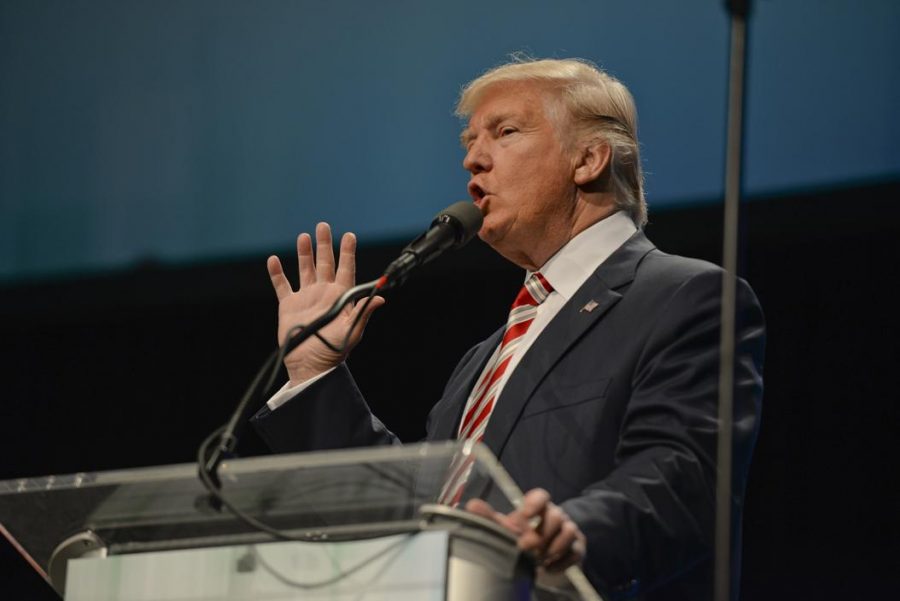Republican presidential candidate Donald Trump outlined his energy plan in Pittsburgh Thursday, which he said would improve the United States economy by reducing restrictions on the energy industry.
At a Shale Insight Conference downtown, Trump discussed the plan he rolled out in May and said the key to a successful American economy is increasing energy production.
“Producing more American energy is an essential part of my plan to making America wealthy again,” Trump said.
The event Trump attended –– an annual two-day conference of the Marcellus Shale Coalition to about energy security and developments and innovations in the production of shale gas –– was held at the David Lawrence Convention Center in downtown Pittsburgh Wednesday and Thursday. Organizers said 1,300 people attended over the course of two days.
Marcellus Shale Coalition is a group of united companies that produce natural gas through hydraulic fracturing, or “fracking.”
The process involves drilling into shale –– a type of sedimentary rock –– and then using high-pressure water to force natural gas out of the rock. The rock fractures under the water pressure. In the Pennsylvania area, there are two types of shale rock, Marcellus shale and Utica shale.
Fracking, though, has produced controversy among environmentalists, policy makers and industry advocates. Fracking uses large amounts of water that must be transported to the excavation site at an environmental cost. Environmentalists argue that harmful chemicals used at the fracking site can seep into and contaminate surrounding groundwater.
The conference typically includes several speakers and panels from companies in the coalition. Scheduled speakers for this year’s conference included Gary R. Heminger –– chairman, president and CEO of Marathon Petroleum Corporation –– and former presidential candidate Rick Santorum.
Trump’s talk Thursday comes as he gains leads in battleground states such as Ohio and Nevada. Hillary Clinton, however, is still maintaining the national lead by six points according to a NBC/Wall Street Journal poll released Wednesday. She’s also up by an average of six points in Pennsylvania, according to Real Clear Politics.
In his talk, Trump said his plan will lift the environmental and regulatory restrictions on American energy, which will increase gross domestic product by more than $100 billion each year and increase federal, state and local tax revenues by almost $6 trillion over four decades.
By his estimate, lifting restrictions will increase total economic activity in the United States by more than $20 trillion over the next 40 years. According to Trump, his overall economic plan will create 25 million jobs over the next decade.
“I believe we can reach beyond, actually four percent growth, why not?” he said.
Trump also slammed Democratic presidential candidate Clinton’s economic policies, including her stance on energy production, fracking and coal use.
“[Clinton’s economic plan] will help only her wealthy donors and global special interests who benefit from the rigged system.” Trump said. “Hillary Clinton wants to put the coal miners out of work.”
William Wang, an investment manager from New York, said he didn’t come to the conference to see Trump, but rather to learn more about the Marcellus and Utica shale gas companies, as well as the shale industry.
When it comes to the Republican presidential candidate, Wang said Trump’s actions are often based on his own personal interests.
“My personal view? I would never support him,” Wang said. “There’s just not a single thing about this person that I can find that I respect. At all.”
Ellen Montgomery, account representative at Cathedral Energy Services, said Trump’s economic plans made good business sense.
“I think that [Trump] is quite understanding, not just of our industry, but of what we need to do in this country,” Montgomery said. “Lowering the taxes across the board for business is going to allow and encourage businesses to come back and to develop especially in this region.”
According to Wright, the coalition invited the presidential candidates from both major political parties to the conference in an attempt to create a nonpartisan environment. However, Wright said Clinton respectfully declined.
Clinton’s energy policies include switching from coal and oil energy to natural gas energy in order to reduce air pollution. Clinton’s policies also include safeguards such as replacing or repairing leaky natural gas pipelines and building high-quality new pipelines.
Erica Clayton Wright, vice president of communications and membership for the Marcellus Shale Coalition and co-organizer of the event, said Pennsylvania, Ohio and West Virginia play a critical role in the natural gas industry.
“It simply just makes sense for us to partner as a region so that we have a unified voice, not only on regulatory topics [and] policy, but this industry is bigger than state borders,” Wright said.



